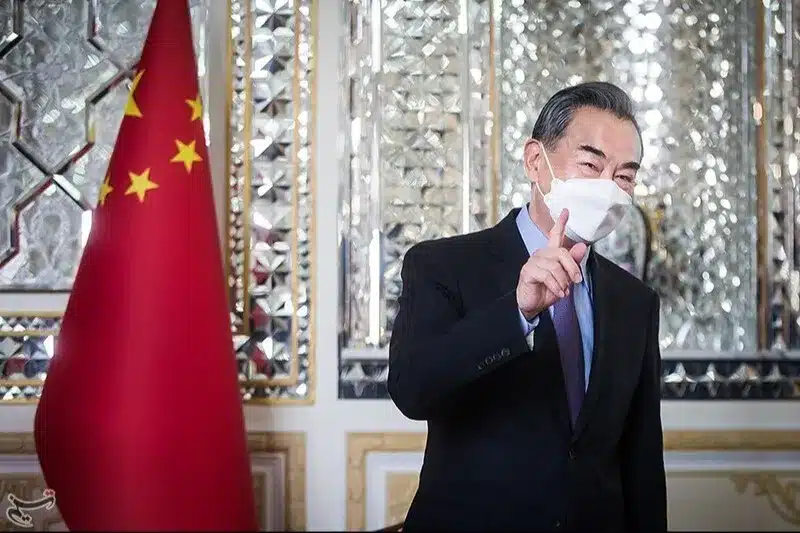PRC Foreign Minister Wang Yi at the signing of a 25-year China-Iran cooperation agreement. March 27, 2021.
While the United States and China may not label each other as enemies, over the last decade, Washington has referred to Beijing as a competitor in better times and adversary in our current nadir. In the ongoing Israel-Iran conflict, one of the most contentious issues is the staunch opposition from both Israel and the United States to Iran’s pursuit of nuclear weapons. So where does China—described by some in Washington as “America’s most consequential geopolitical challenge”—stand on this issue? Would Beijing support Tehran simply to counterbalance Washington? And if not, why?
A June 16 editorial in the Chinese state-run Global Times called on both Israel and Iran to de-escalate their military confrontation. “The mutual attacks have not only caused casualties and damage to infrastructure,” the Times wrote, “but have also set a dangerous precedent by targeting nuclear and energy facilities.”
“The urgent priority,” the article continued, “is to take immediate steps to prevent further escalation and return to the path of resolving the issue through diplomacy.”
The editorial, while advocating for a de-escalation, also offered veiled criticism of the United States: “Many analysts believe that Washington’s ‘maximum pressure’ policy on Iran was a key factor behind the sudden escalation between Israel and Iran.” Citing Singapore’s Lianhe Zaobao, the editorial noted that Washington had given Tehran a 60-day deadline to return to nuclear talks—only for Israel to launch a strike on day 61, a move that hinted at diplomatic coordination between the two allies. The article points out that, “as a country with special influence over Israel, the United States should particularly shoulder its due responsibilities in its words and actions.”
The editorial was reposted by many other Chinese media outlets. It closely echoes Chinese Foreign Minister Wang Yi’s remarks during separate phone calls with his Iranian and Israeli counterparts on June 14, in which he urged restraint and a return to diplomacy.
One interesting observation is that over the years, Chinese media have rarely engaged in an in-depth discussion about whether Iran should be allowed to develop nuclear weapons. Instead, the focus has been on how to prevent such development and how to maintain regional stability.
Still, China’s official position on the issue is clear. On March 14, Beijing hosted a trilateral meeting with Russia and Iran to discuss the Iranian nuclear issue. Following the talks, the three countries issued a joint statement reaffirming the importance of the Nuclear Non-Proliferation Treaty (NPT) and welcoming Iran’s commitment to the peaceful nature of its nuclear program.
That same day, Chinese Foreign Minister Wang Yi outlined five key points on China’s stance toward Iran’s nuclear program. The most notable among them was Beijing’s assertion that “Iran should continue to honor its commitment not to develop nuclear weapons, and all parties should respect Iran’s right, as a signatory to the NPT, to peacefully use nuclear energy.”
On April 30, Wang reiterated these principles, again emphasizing that while China supports Iran’s peaceful use of nuclear energy, it opposes any effort to develop nuclear weapons.
So why does China, despite its competition with the United States, oppose a nuclear-armed Iran?
Former Global Times editor-in-chief Hu Xijin offered insight into this question in a June 16 commentary. “Nuclear non-proliferation is in the interest of the entire world—and it is in China’s national interest,” Hu wrote. He pushed back on the notion—shared by some Chinese citizens—that Iran’s possession of nuclear weapons might be beneficial to China, as they would be aimed at Israeli or U.S. bases in the region rather than at China. “This is flawed thinking,” he wrote.
Hu drew a parallel with U.S. opposition to nuclear weapons in the hands of its allies in Asia:
The United States does not support Japan, South Korea, including Taiwan, in developing nuclear weapons. Even if these Asian allies had nuclear weapons, they would not target the US with them. However, the general principle of nuclear non-proliferation is more important to the United States. If the US does not encourage Japan, South Korea, and Taiwan—which is in intense confrontation with the mainland—to possess nuclear weapons, then our non-support for Iran’s nuclear development and our advocacy for a nuclear-free Korean Peninsula follow similar strategic security logic.
As for how to prevent Iran from acquiring nuclear weapons, People’s Daily, the Communist Party’s flagship newspaper, wrote in a March editorial following the trilateral meeting that “the solution is clear: only the full and effective implementation of the Joint Comprehensive Plan of Action (JCPOA) can provide a fundamental resolution.”
The JCPOA—also known as the Iran nuclear deal—was signed in 2015 between Iran and the P5+1 (China, France, Russia, the U.K., the U.S., and Germany) and the European Union. The goal of the deal was to ensure Iran’s nuclear program remained peaceful while affirming its right to civilian nuclear energy.
Nevertheless, in 2018, the Trump administration unilaterally withdrew from the agreement, calling the deal “disastrous” and “one-sided.”
The June 17 Global Times editorial further delved into the nature of the Iran-Israel conflict: “While nuclear issues appear to be the trigger, the root cause lies in the security dilemma. Israel, fearing a nuclear Iran, has adopted a preemptive strategy—but its violation of Iran’s sovereignty and security may ultimately make it less secure.”
It is not surprising, then, that Chinese scholars and officials consistently frame the Iranian nuclear issue in terms of preserving the international non-proliferation regime and maintaining regional peace and stability. Whether this broader strategic outlook—centered on the concept of “security dilemma”—is the key driver behind China’s position remains to be seen. But for now, one thing is clear: despite its rivalry with the U.S., China opposes a nuclear-armed Iran.
Juan Zhang is a senior writer for the U.S.-China Perception Monitor and managing editor for 中美印象 (The Monitor’s Chinese language publication).
The views expressed in this article represent those of the author(s) and not those of The Carter Center.

